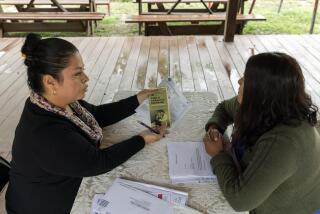Column: A new Obamacare myth is born: Hordes of Americans are ‘gaming’ the system
With the traditional attack points on the Affordable Care Act having faded away--most enrollees were already insured (wrong), millions of people lost their coverage and couldn’t replace it (wrong), etc.--Obamacare’s critics have been looking for new ones.
An up-and-coming star of this firmament is the notion that Americans are “gaming” the system by waiting until they’re sick to enroll in an individual policy, then dropping it as soon as they’re cured.
This theory has been around for a while, but it got a jolt of life last month when UnitedHealth Group appeared to blame such a strategy for losses that were leading it to consider withdrawing from the individual insurance exchange market as soon as 2017.
The idea that there’s huge amount of strategizing is la-la land.
— Peter V. Lee, executive director of Covered California
United CEO Stephen Hemsley said in a Nov. 19 conference call that over the last year the company had seen “a meaningful portion of membership move out, and new membership move in...outside the enrollment period. Those have been strong users of services.” A few days earlier, Aetna CFO Shawn Guertin told an investor conference that his firm had seen “a lot more people coming in and out of the system,” using services, and then leaving.
These remarks set the hearts of some members of the Obamacare deathwatch aflutter. Bloomberg’s Megan McArdle speculated that on the possibility of gaming by customers, though she later owned up via Twitter to being “sort of skeptical” that such strategies were widespread.
Cato Institute’s Michael Cannon, however, declared in Forbes that such “free-riding,” which poses “a serious threat to Obamacare’s future,” has now been established as “a real problem.”
Indeed, because I had questioned Cannon’s assertion in April 2014 that the ACA actually creates “incentives...for healthy people to drop their coverage, save their money, and wait until they get sick to re-enroll,” he called me out to demand an explanation. (I could tell because his new Forbes piece is subtitled, “Revisiting My Debate With Michael Hiltzik.”)
Well, Mr. Cannon, you asked for it.
Let’s start with some definitions. Under the ACA, most people can sign up for coverage only during annual open enrollment periods. For coverage beginning next Jan. 1, open enrollment runs Nov. 1 through Dec. 15, though one can enroll through Jan. 15 for a plan beginning Feb. 1, and through Jan. 31 for a plan taking effect March 1.
Outside that time frame, you’re out of luck for 2016 coverage unless you qualify for a special enrollment period. These typically are triggered by a “life event” such as getting married or having a baby. Since the ACA is a federal law imposing rules on health plans operating at the state and local levels, it added several other triggers, including the loss of one’s job and therefore employer-paid coverage, a change in income that might qualify someone for Obamacare subsidies, or a relocation from one state to another.
The question is whether people who avoid signing up for coverage during open enrollment are starting to exploit these triggers to sign up after they get sick or injured. This would seriously undermine the insurance pool by allowing healthy people to stay out of it until they need treatment, removing the cross-subsidization of users by non-users that’s the essence of all insurance policies. (Accident-free drivers subsidize those in collisions, and so on.)
Cannon thinks this has now been shown to be “a real problem.” Is that so?
Even a casual reader of the United and Aetna statements might notice what’s missing from them: data. United’s Hemsley said only that “a meaningful portion” of members were moving in and out during special enrollment. What’s “meaningful”? Who knows?--his firm declined to provide actual figures. Aetna’s Guertin said there’s “a lot more people coming in and out of the system” this year than last, which doesn’t quite rank as a concrete number.
Neither company suggested that this trend reflected a deliberate gaming strategy by members, as opposed to possible opportunism; people can drop ACA coverage for many reasons--for example, they can find jobs with health benefits, age into Medicare, or pass away. The companies did say that the special-period enrollees tended to require more medical services than the general membership, but that’s hardly surprising. For one thing, some life events are tied to the need for more services--marriage is often followed by pregnancy, followed by having a baby, followed by vaccinations and pediatric visits even for infants in the pink of health.
Also, some people who cared so little about insurance that they skipped open enrollment might not enroll even after experiencing a qualifying life event--unless they’re sick or hurt. In their case, special enrollment is a gift. But that’s much different from saying that people are actually counting on conjuring up a life event to cover them if they have an accident, which is what Cannon suggests is happening.
One insurer has provided numbers. Iowa’s Wellmark says 135 members signed up, got treatments, and then dropped their coverage after running up sizable bills. But they were about one-tenth of one percent of an individual insurance pool that appears to be about 150,000 members. (It might help to know that Wellmark issued this figure to help support its application for a rate increase of up to 13.3%.)
But other insurers say they aren’t fazed by the trends United and Wellmark spotlighted. As I reported after United’s announcement, Anthem and Aetna both said they’re in the exchanges for the long haul.
The view of the “gaming” camp seems to be that hordes of Americans are sitting around without insurance and waiting for the chance to jump in when they get sick.
Is this plausible? We asked Covered California, which operates the largest and most comprehensive insurance exchange in the country with 1.3 million currently active enrollees. Peter V. Lee, its executive director, says they’ve seen no evidence of “fraud or inappropriate enrollment, and we’re looking constantly.”
Covered California is one of the few exchanges that actually has assembled data on special enrollments -- a staff presentation for its board covering Feb. 23 through May 10.
Of 117,024 special period enrollees, the largest single category was 43,929 persons allowed to enroll late after claiming they hadn’t been aware of the tax penalty for non-coverage. The special period, which lasted through April 30, was authorized by the federal government and isn’t likely to be available in the future, Lee says.
Of the other enrollees, most -- 41,390 -- had lost their other health coverage, often because of a job loss. Some 30,000 had experienced a qualifying life event such as marriage or a baby’s arrival. Lee says Covered California doesn’t normally demand proof of a life change such as a marriage license or a baby’s birth certificate, though it might start to do so if it detects signs of gaming. So far, however, “the idea that there’s huge amount of strategizing is la-la land,” he says.
The truth is that building a coverage strategy around special enrollment periods is not easy, convenient or rational. The road map of special-enrollment options Cannon published in 2014 was almost comically unconvincing. He even imagined a world of “quickie ‘Obamacare marriages’ formed solely to qualify people [for] Exchange coverage,” with websites springing up to make the connections, like Ubers for desperate seekers of healthcare.
Cannon further noted that readers who got sick could simply move to another state. Or they could have a baby. He observed that residents of states accepting Obamacare’s Medicaid expansion could get immediate coverage by reducing their income to near-poverty level to qualify for Medicaid, then restoring it after enrollment. This smelled awfully like fraud. Even assuming the possibility of escaping discovery and prosecution, how many people actually would bother to go through this simply to avoid paying for health insurance?
One gaming strategy attracting some attention from insurers involves people not signing up late, but leaving coverage early -- after receiving treatment. This is an artifact of a federal grace period allowing people to go up to 90 days without health insurance before incurring a tax penalty for non-coverage. (The annual penalty for next year will be $695 for uncovered adult and $347.50 for each child, to a family maximum of $2,085 -- higher for those with incomes over about $100,000. It’s prorated for every month that someone is uncovered.)
The theory is that determined gamers could stop paying premiums in October and still avoid the penalty. Whether this is destined to become a popular subterfuge is questionable. For one thing, the 90-day grace period only applies to people receiving subsidies via the federal exchange -- for everyone else, the tax penalty kicks in after a month. Covered California’s Lee says his organization hasn’t seen evidence of early terminations, either. He called it “folklore.”
One core assumption of Cannon and others convinced that a whole lot of gaming’s going on is that Obamacare is a mass of loopholes waiting to be discovered by the canny average American. Because the ACA guarantees that even the sick can sign up for insurance once a year, Cannon wrote last year, Obamacare made going without insurance until it’s needed a “safer bet” than before the ACA, when a sick person could be excluded from the individual insurance market for life. “Going uninsured will save you even more money than before,” he wrote.
But this argument is deeply flawed. Even Cannon acknowledges that most uninsured people face dire financial risks, not to mention early mortality, if they get sick or hurt and have to wait as long as a year for open-enrollment coverage. (One solution he offered them was “relying on friends, family, or the kindness of strangers.”)
The other assumption is that most people consider health insurance a burden to be shunned unless absolutely necessary. Where’s the evidence for that? In most parts of the United States outside the corridors of the Cato Institute, living without health coverage isn’t regarded as heaven, but hell. That’s why employers routinely offer health plans to employees they’re trying to recruit, and why the rising number of uninsured Americans was considered enough of a crisis for Congress and President Obama to enact the ACA in the first place.
Keep up to date with Michael Hiltzik. Follow @hiltzikm on Twitter, see our Facebook page, or email michael.hiltzik@latimes.com.
More to Read
Inside the business of entertainment
The Wide Shot brings you news, analysis and insights on everything from streaming wars to production — and what it all means for the future.
You may occasionally receive promotional content from the Los Angeles Times.











